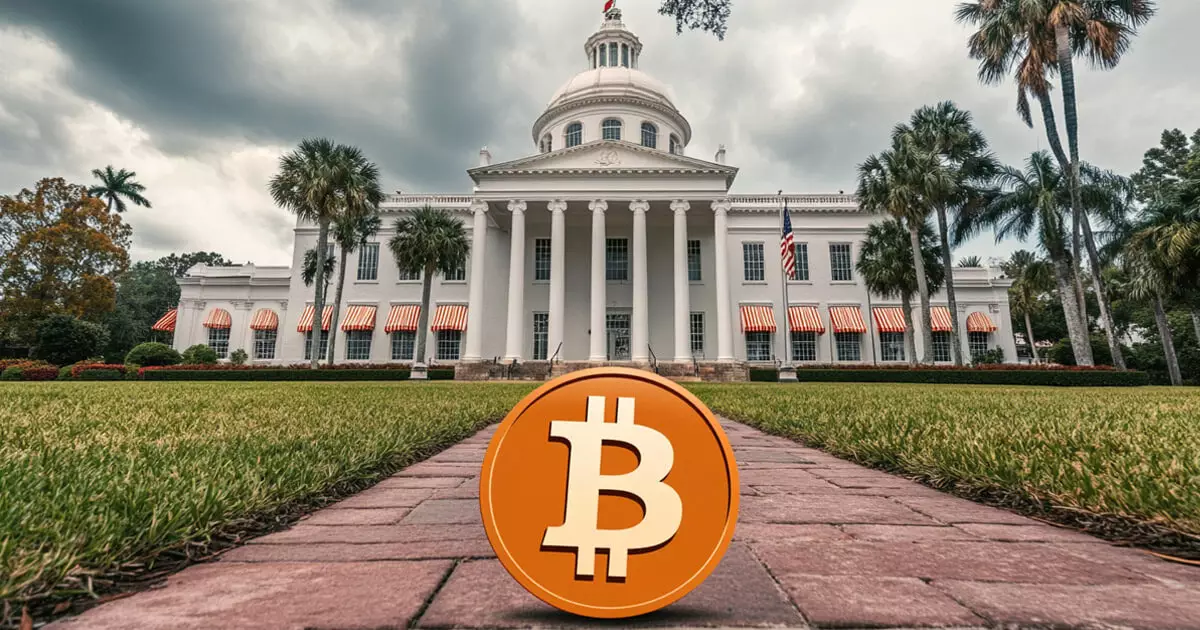As discussions around digital currencies gain momentum across the country, Florida emerges as a frontrunner in embracing Bitcoin (BTC) within state financial reserves. Senator Joe Gruters recently articulated a visionary strategy aimed at integrating Bitcoin into Florida’s public financial infrastructure, aimed at bolstering economic resilience amid an ever-fluctuating market landscape. This is not just a passing trend or mere speculative venture; it represents a seismic shift in how state governments perceive cryptocurrency as a tool for fiscal stability and sovereignty.
Senate Bill S0550, introduced earlier this month, is a significant start. The legislation would empower Florida’s Chief Financial Officer to allocate up to 10% of assets from major funds to Bitcoin investments. In a time characterized by rising inflation and uncertainty in traditional markets, Gruters envisions this move as a safeguard against the eroding purchasing power of the dollar. This proactive stance towards integrating a decentralized financial asset into state assets is a radical departure from conventional economic practices, and it establishes Florida as a pioneer in the cryptocurrency space.
Embracing Freedom and Innovation
At the heart of Gruters’ proposal is a desire to create a “pro-freedom state” environment—a mantra that resonates deeply with many Floridians who value personal liberties. The support for Bitcoin is not merely about financial returns; it is intrinsically tied to broader ideals of freedom, innovation, and individual empowerment. By allowing investment in cryptocurrencies, Florida would not only be claiming its stake as the nation’s Bitcoin hub but also catering to a demographic hungry for alternatives to state-controlled fiat currencies.
Moreover, this approach aligns seamlessly with the political ideology drifting towards center-right liberalism. Gaining traction in this space means more than just following trends; it signifies standing against governmental overreach and fostering an economic ecosystem where individuals can thrive. Gruters’ assertion that Florida should lead this charge reflects a commitment to substantial change that champions fiscal autonomy and promotes individual rights over oppressive regulations that blanket many other states.
Lessons from Economic Refugees
The impact of the COVID-19 pandemic cannot be overstated when discussing Florida’s evolving economic fabric. The influx of “economic refugees,” as described by Gruters, paints a vivid picture of a state that has become a haven for individuals seeking not just warmer weather but also the promise of financial freedom. The appeal resonates with those disillusioned by restrictive policies elsewhere, marking Florida as an attractive destination for transplants seeking new opportunities and transparent governance.
Positioning Bitcoin as part of Florida’s investment strategy makes apparent sense in this context. Many new residents are not simply looking for a place to reside; they desire a lifestyle defined by minimal interference, one that Bitcoin can support with its decentralized nature. Florida’s legislative reform towards digital assets aligns perfectly with these new residents’ aspirations, creating a mutually beneficial environment that nurtures innovation and economic growth.
Setting the National Tone
Senator Gruters believes that Florida’s forward-thinking approach could set a precedent for other states to follow. By positioning the Sunshine State as a national exemplar in Bitcoin acceptance, he aims to lead a broader movement towards assets that resonate with freedom-loving individuals across the country. This confidence in Florida’s ability to influence national policy reflects a central theme that the future of economic governance might be decentralized and community-oriented rather than federally dictated.
Critically, the movement toward Bitcoin adoption serves as a counter-narrative against the often-volatile federal alternatives. While many states may approach cryptocurrency with skepticism, Florida’s embrace of Bitcoin speaks to a larger narrative of empowerment—a simple return to the free-market principles that underpin American economic freedom.
In a world increasingly dominated by digital transactions and technological innovation, Florida’s quest for Bitcoin integration is not merely a financial maneuver; it is a clarion call for a new era of economic liberation. This shift ensures that Florida remains at the forefront of the cryptocurrency revolution, potentially leading the charge toward a more decentralized financial future.


Leave a Reply